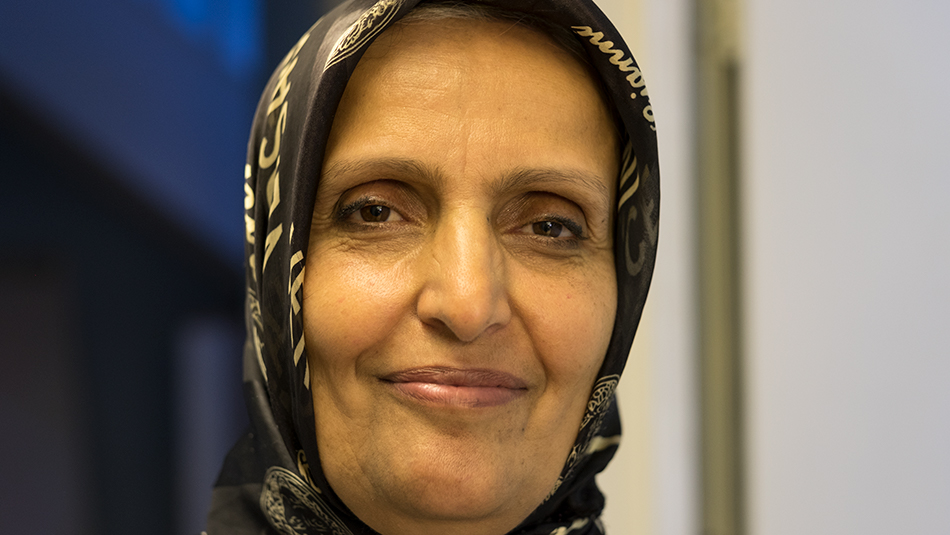Older immigrant women are suffering from loneliness in Cardiff. Language barriers, cultural shocks and closed communities have left them out of the rest of the society. How can a simple Friday lunch beat these problems?
The British accent is a minority in this basement of Riverside, Cardiff. Luckily, the food is too.
Aromas of samosa, paratha and spiced rice come from the kitchen of the charity Women Connect First, and a dozen women speaking in Urdu, Hindi, Arabic and English is loudly waiting for them.
Covered by Hijabs, dresses or green saris, these women are eating, chatting, clapping and some of them even singing. Everything now is mixed on the plate and in their minds. There are a couple of them in a corner about to cry.
This is a regular Friday at Wales World Café, an initiative which is bringing more than memories to the older immigrant women of Cardiff. This business is tackling loneliness caused by age, language, cultural differences or closed groups through food.
Technicians would call them older black, Asian and minority ethnic (BAME) women. Here they are just “friends” and every bite is a flavour of what they left behind. What is in the food that is beating loneliness? “A whole world,” says Rihanna Nadine, one of the four ladies behind Wales World Café. The cost: £3.50.
Social food and language
According to the latest report “Wellbeing Wales”, 17% of people report feeling lonely in the country. That means one in five people. But for BAME women, the figure can be worse: One in four people in the UK do not identify themselves as “White”, and there can be up to 19 ethnicities during a regular Friday at Wales World Café.
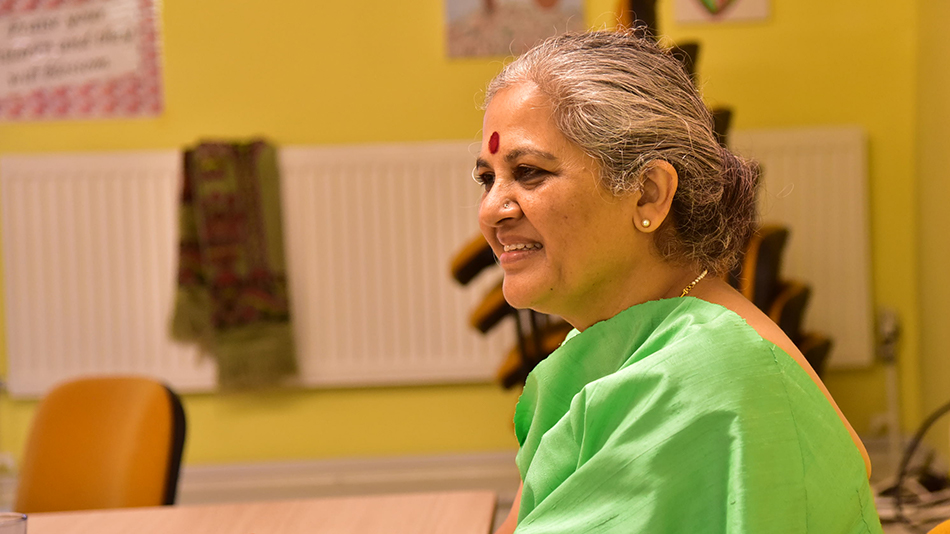
Moreover, according to the Office for National Statistics (ONS), older women report more feelings of loneliness, and as they live longer than men, they have more risk of becoming widows and more health issues described as “limiting” conditions. All are risk factors that increase other risks like depression, which according to the Royal College of Psychiatrists reports affect from between 8 to 12% of the general population. In the case of the older adults, this figure can be up to 20%.
That’s why not only women from Riverside are sitting down each Friday. People from the different immigrant communities of Splott, Grangetown, Butetown or even further are among Wales World Cafe’s customers. Mehnoor Jeetun is one of them. She works in Canada but is visiting her mother Shahida in Cardiff.
Food is a language that everyone understands,”
Mehnoor Jeetun
Originally from Kashmir and living an ocean apart, mother and daughter look to the rest of the table. They are trying to explain the first key in the success of this café. In front of them, there is an African woman with her child in their arms whispering in a language which is not English. Next to them, a lady receives advice in Arabic through tears. Nobody seems surprised, and everyone has a plate with food from three different countries.
“Food is a language that everyone understands,” says Mehnoor, and she is right. Food is a straightforward way of overcoming the first barrier that most older immigrant women face: language. “[Here] They don’t need a common language. I have seen people who can’t speak English, not even a word, but they still communicate. I think these break boundaries,” says Mehnoor.
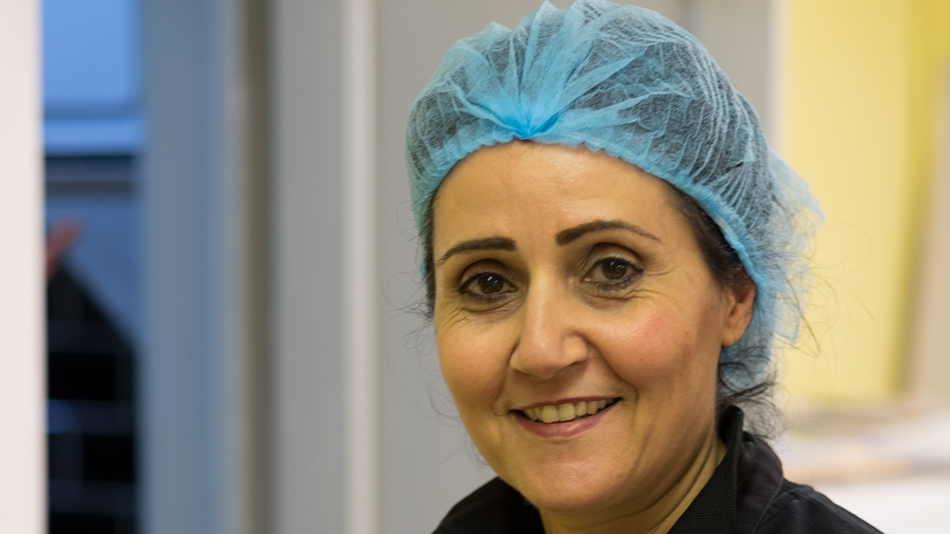
For Shahida this is a central issue too. She came to the UK with her husband a decade ago, and she has been teaching English to other women in the same building thanks to Women Connect First classes. She knows how difficult and isolating it can be for older immigrants if they don’t communicate in English.
“These ladies over 50 [years old] who usually are alone, where they cannot even talk to their grandchildren because they are English speakers,” says Shahida. “[This place] removes the isolation, and they mix with other people. They spend time here and feel happier and more confident.”
That’s why between every bite, some of the participants’ reserve time to rehearse their English or ask questions about how to do groceries, or how to go to the GP. “They all speak English. It’s a unified language for them. Though they don’t speak it very well. But this is how they communicate, and they make friends. I think it’s a supportive friendship,” says Amal Beyrouty, Project Manager of Golden Years at Women Connect First, and who has been supporting the group since 2016.
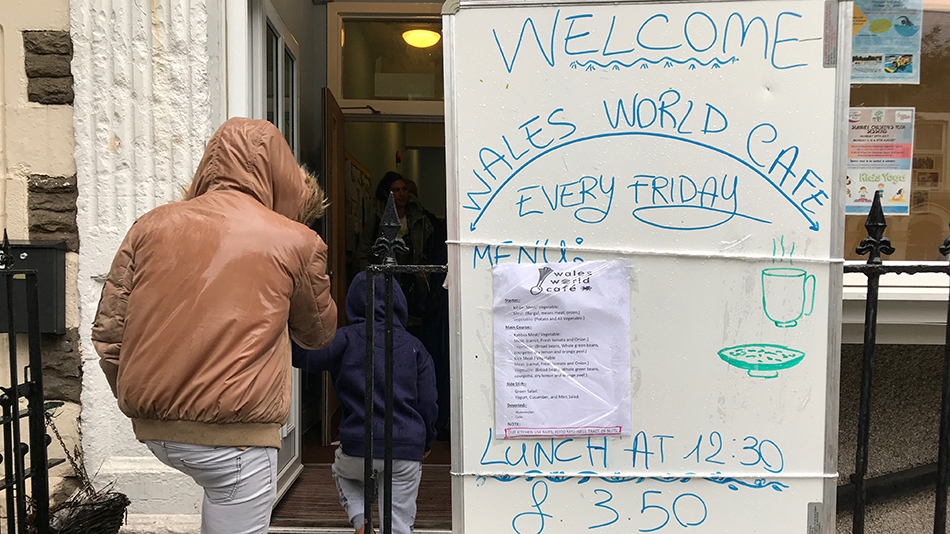
Kalpana Natarajan explains this concept with the bread that she just ate in the café. “I normally don’t eat bread; I am Brahman. Today there was no meat in [the menu], and then [women] ask you why you don’t eat meat, and then you tell them a bit of why you don’t eat and things like that. One thing leads to another.”
The four women in the kitchen had a similar experience with the language. Ten years ago, Rihanna Nadine was an immigrant like many of the women who sit down every Friday to eat her food. The Taliban arrived at the area where she used to live, forcing her to leave, and stay in the UK. It’s a situation that affects her, but like many of the people in the room, she hides it under a big smile. “If you see people laughing [here] it’s not really [because] they are very happy. Inside [there] are big stories. If you are not laughing, people will not sit next to you because you are crying,” says Rihanna laughing.
If you see people laughing [here] it’s not really [because] they are very happy. Inside [there] are big stories.”
Rihanna Nadine
Rihanna arrived with her two children to her sister house in Leeds, where she felt safe. Able to read and understand English, Rihanna realized that speaking was a primary objective in order to have a routine. But as most of the women at Wales World Café, it’s a lonely way. Rihana for example heard as an advice “‘If you want to learn English you need to go by yourself.’” But here in the basement, the road doesn’t seem so alone.
Blooming
Many of the women at the café had to face a change in their life. They come from communities where they have a specific role to play for many years. But most of them have had to learn new skills after turn 50 years old. Kalpana Natarajan explains the perspective of an Indian woman.
“In South Asia, where we are from, it is such a patriarchal society that anything you do, you need the man’s consent for it,” she says explaining that this could be in the most minimal details for women. “So, as a personality, many of them don’t bloom fully. They directly or indirectly are dependent. Either the father has to let them bloom, and then the husband has to understand that because even if you have a good formal education, the social education has to be deep-rooted in every man,” says Kalpana.
In South Asia, where we are from, it is such a patriarchal society that anything you do, you need the man’s consent for it,”
Kalpana Natarajan
For those who arrive from other latitudes, it is not different. “When they arrived here [UK], they weren’t allowed to integrate and learn. They just stay at home looking after the family. So, they’ve reached an age of 45 or 50, and they have no skills. The husband might have passed away or gone with another person, or maybe [they have] a disabled person at home and she finds herself responsible for that. The children moved on and left the house, and then this what causes depression and isolation because they can’t communicate,” says Amal.
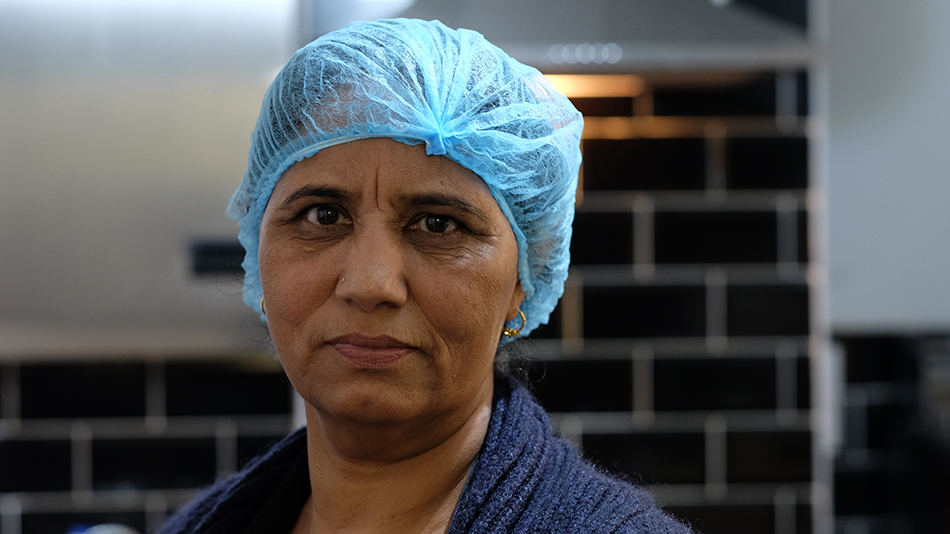
Many of them have a starting point in widowhood, which is related to a particular kind of loneliness called emotional loneliness. Around 20% of people in Wales have experienced emotional loneliness, which is related to the absence of a close personal relationship. While 34% of people in the country are lonely because of a lack of more extensive social contacts.
Partly, that’s why the team behind Wales World Café rush after finishing their duties in the kitchen. They want to sit down with the other ladies and talk. They come with dessert too, and this time it is a sweet watermelon. “I mix with other girls, other women from other countries and you can talk, especially if you are in the same age. They can speak freely. You want to express something. You learn from them something different, but the main thing is being out of the house and having fun,” says Jenan Alshibibi, who cooks every Friday and has roots in Iraq and the UK.
I mix with other girls, other women from other countries and you can talk, especially if you are in the same age. They can speak freely. You want to express something.
Jenan Alshibibi.
Cultural difference
But the most significant barrier for these women is culture. In 2018, the UK received an estimated 258,000 people intending to stay 12 months or more. People coming from different backgrounds and cultures have to adapt to British manners and vice versa, but for older BAME women the process is longer. “As an immigrant, I think the country or the city as a whole is really hosting. If so, you don’t feel that you are rejected in that community. But the difference is we come from different communities where people are closer to each other,” says Amal who comes from Lebanon.
Some of the women have difficulties in finding friends or talking to their neighbours. “Where I come from, neighbours knock at each other’s doors, have breakfast together. Here it is not the way. So, it’s really different ways of living and different cultures. This is why they feel that they are alienated, or they are not accepted, maybe in a way because there are boundaries and we don’t have these boundaries in our social lives,” says Amal.
For the older women coming from India, Pakistan or the Middle East, this is also an issue. According to the 2011 census, Riverside, Grangetown, Gabalfa and Plasnewydd are the areas where these communities are clustered, where non-white groups have grown by 150% in a decade. But what can be an opportunity, can also be a problem.
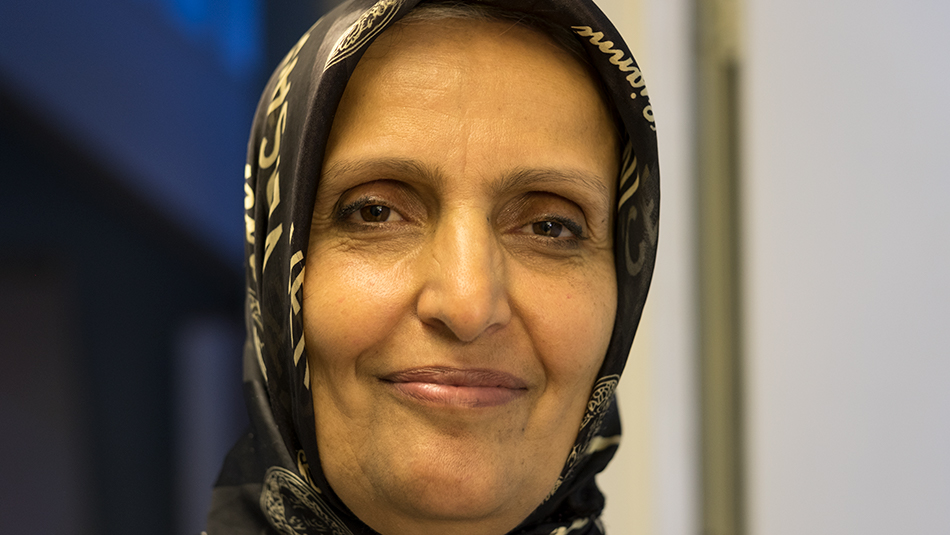
Many of the older women who arrive in Cardiff only interact with their relatives or immigrant neighbours, and they have little contact with other groups. “So, as a child, [British people] will only talk to you if you speak first. They’ll distinguish between a neighbour and a friend. Usually Indian, they will say if you talk to somebody for half an hour: ‘Oh, I know her, I know her as a friend.’ That’s not a friend, that’s just an acquaintance, and that’s different, and that difference is still over here, you have to understand that,” says Kalpana Natarajan.
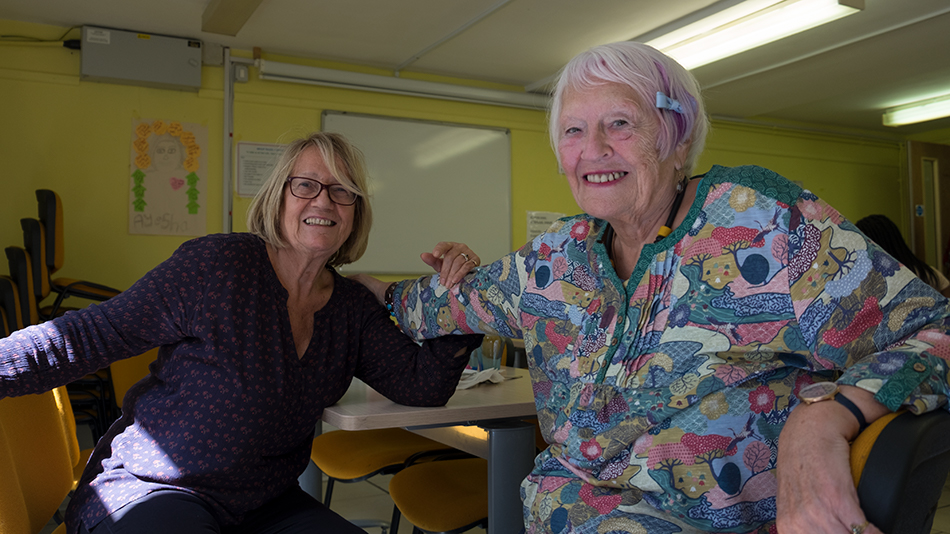
But the café has been a means of overcoming this issue. Usually, people from different charities and organizations that assist immigrant communities sit down for lunch, mixing with the regulars. “It’s a good way of bringing people forward. It’s attracting women from different communities. It’s not only for women who are cooking or learning skills. But people from the community they come, and it became a hub, a social hub, and it’s a safe place, so they come, talk, sometimes express their views or the problems. They get support from each other. Like a family gathering really,” says Amal.
It’s not only for women who are cooking or learning skills. But people from the community they come, and it became a hub, a social hub,”
Amal Beyrouty
That can be noticed at the end of lunch. Among the empty plates, people are starting to get up and become even closer to each other. They hug, kiss and some of the cooks say: “We’ll miss you.” The closeness between them is like the one between Mehnoor and Shahida. “It’s just food, but it’s a good start,” says Mehnoor, who will travel to Canada in the next few days, and Shahida will do the same to India. They will live apart from each other for several months, but next time, they will come to the café. The samosas, paratha and spiced rice will be waiting for them, and luckily, the same friendship in this British basement too.
